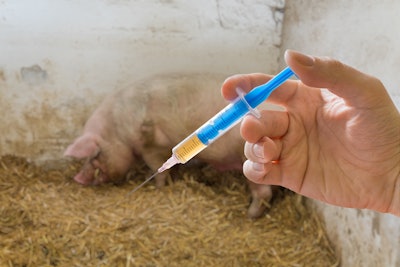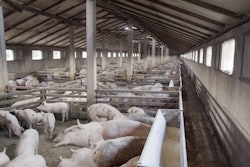
As new outbreaks of African swine fever (ASF) are confirmed sporadically across several of its regions, the government of the Philippines continues to prepare for the introduction of a safe and effective vaccine.
In the Philippines, a new task force has been formed to evaluate vaccines against ASF in pigs, as part of the national authorization process.
Task Force Moccus has been formed within the country’s Food and Drug Administration (FDA), reported GMA Network last week. The group is tasked with ensuring that drugs and vaccines used to control ASF in the Philippines are safe, effective and good quality.
In the Southeast Asian state, ASF has caused heavy losses of pigs and mounting costs since it was first detected there four years ago this month.
Just a few days earlier, the country’s president said the first phase of testing ASF vaccines has been completed, reported Philippines News Agency (PNA). First safety and efficacy trials have been carried out by the Bureau of Animal Industry (BAI) at the Department of Agriculture, he said.
Speaking at Livestock and Aquaculture Philippines 2023, President Ferdinand R. Marcos Jr. added that Phase 2 trials are now in progress. Meanwhile, the national FDA is preparing to issue registration certificates for these vaccines, he said.
While the prospect of effective vaccines is a cause for optimism, Marcos stated that the administration is aware of concerns expressed by some scientists about the vaccine.
The vaccine is 80% effective, the president reported.
In June, it was reported that two vaccines were expected soon to be authorized for use in Vietnam.
ASF outbreaks ongoing in several Philippines regions
ASF outbreaks are ongoing in 58 municipalities and cities, according to the latest situation update from the BAI (as of June 26). These affected areas are located in 16 provinces in nine different regions.
Among these regions is Western Visayas, where recent outbreaks have been reported by PNA in the city of San Jose de Buenavista, and the municipality of Hamtic in Antique province. Latest figures put pig mortalities in Hamtic at more than 3,900, and at 240 across more than half of the city’s communities.
In the city, authorities have banned backyard slaughtering of pigs, according to the same source. Instead, they must be sent to the municipal slaughterhouse, together with a certificate of origin. Furthermore, the meat must be sold within the same area.
Around 4,000 hog raisers are set to receive cash support from the authorities in the same region. This came after the deaths of almost 15,800 pigs in more than half the districts in the province of Negros Occidental. The worst peak in mortality is reported to have passed.
In neighboring Negros Oriental in the Central Visayas region, no pig mortalities were reported for two weeks. However, PNA reports that the BAI has recently sent a technical team to the province. This came after reports of elevated hog mortalities in Bais city, and Vallehermoso town.
At the end of June, ASF was confirmed in a third region, Central Luzon. Officials ordered biosecurity to be increased in Zambales province after pigs tested positive for the ASF virus at three locations in the town of Candelaria.
Furthermore, in order to support farms without causing pork prices to rise, authorities in Bataan province have declared a “state of calamity.” The declaration follows ASF virus -positive tests on 333 pigs from 17 backyard herds in five of Bataan’s municipalities.
ASF impacts on the pork market
Although the great majority of ASF outbreaks in the Philippines have been in backyard herds, large farms are also suffering from the effects of the disease. This is according to a past president of the country’s pork producers’ federation, reported PNA this month.
As the disease has impacted commercial piggeries in Visayas and Mindanao, he said that domestic pork production has been reduced. However, overall supply has not been affected as the gap has been filled by raising exports.
Focusing government assistance on smaller and less efficient farms will not increase national pig meat output, he said.
President of the Chamber of Food and Agriculture called on the government to prioritize the distribution of ASF vaccine to the larger hog integrators. This sector demonstrates economies of scale and better biosecurity, and has a greater impact on the food supply, he said.
New ASF outbreaks elsewhere in Asia
In the southern Indian state of Kerala, ASF has been detected in three districts at the end of June, according to The Hindu. As a result, around 370 were culled from one farm in Thrissur district, 93 at four premises in Kannur, and more than 40 at a private farm in Idukki.
Meanwhile, local media report that ASF is the suspected cause of death among pigs in Arunachal Pradesh. According to Outlook India, around 30 pigs died suddenly at the end of June in the Tirap district. The carcasses were destroyed before a veterinary investigation could be carried out.
In Indonesia, first cases of ASF have been reported in West Sulawesi, according to the latest update on the disease situation in the region by the United Nations’ Food and Agriculture Organization (FAO). This brings to five the number of provinces with confirmed outbreaks this year. Further cases in East Nusa Tenggara and South Sulawesi bringing the nation’s total cases to almost 57,800 so far in 2023.
In Vietnam, there are active ASF outbreaks in 11 provinces, the same source reports.
Number of ASF-infected wild boar in South Korea has reached 3,151, according to Pig People (as of July 12). This is 10 more cases than a previous update dated June 23.
Since the country’s first cases in 2019, infected wild boar have been found in four provinces. For each of the first six months of this year, the numbers of infected wild boar are below the same months of 2022.
With no new outbreaks in domestic pigs, the total on South Korea farms so far this year remains at eight, and 36 since 2019.
View our continuing coverage of the global African swine fever situation.
Japan reports further cases of classical swine fever
Over the first three months of this year, a total of 373 wild boar in Japan tested positive for the classical swine fever (CSF) virus.
According to a recent notification to the World Organisation for Animal Health (WOAH), infected animals were found in 26 prefectures in six regions of the country.
These bring to 1,486 the number of confirmed cases of this disease in the nation’s wild population since the start of 2022.
Japan’s most recently reported CSF outbreak in domestic pigs was in February.
Like ASF, CSF (hog cholera) is a notifiable disease that affects members of the pig family, according to the WOAH.
Both diseases can cause devastating losses in domestic and wild populations, while not affecting human health. CSF is most commonly transmitted to healthy animals by direct contact from those infected with the virus. It is known that the CSF virus can survive for months in refrigerated pork, and for years in frozen meat.
Despite the similar names, CSF and ASF are caused by unrelated viruses.

















